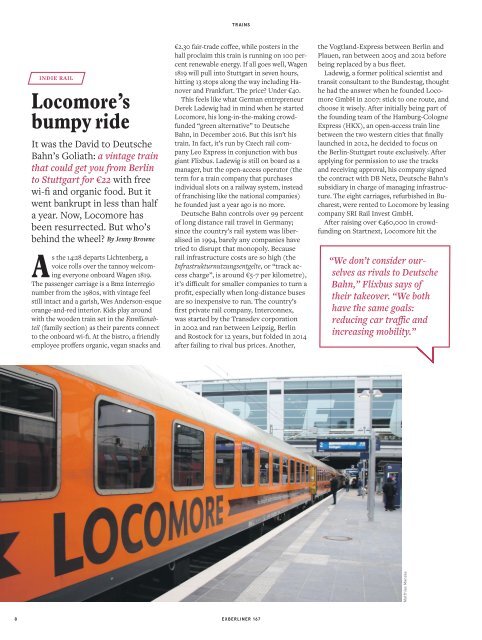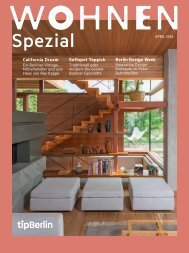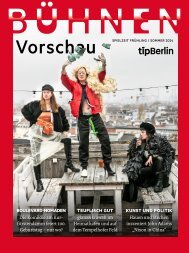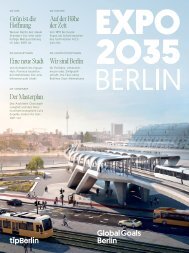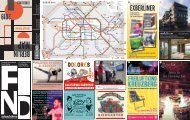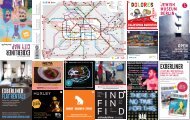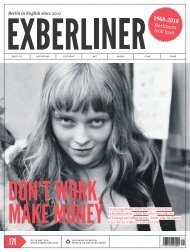Exberliner Issue 167, January 2018
You also want an ePaper? Increase the reach of your titles
YUMPU automatically turns print PDFs into web optimized ePapers that Google loves.
TRAINS<br />
INDIE RAIL<br />
Locomore’s<br />
bumpy ride<br />
It was the David to Deutsche<br />
Bahn’s Goliath: a vintage train<br />
that could get you from Berlin<br />
to Stuttgart for €22 with free<br />
wi-fi and organic food. But it<br />
went bankrupt in less than half<br />
a year. Now, Locomore has<br />
been resurrected. But who’s<br />
behind the wheel? By Jenny Browne<br />
As the 14:28 departs Lichtenberg, a<br />
voice rolls over the tannoy welcoming<br />
everyone onboard Wagen 1819.<br />
The passenger carriage is a Bmz Interregio<br />
number from the 1980s, with vintage feel<br />
still intact and a garish, Wes Anderson-esque<br />
orange-and-red interior. Kids play around<br />
with the wooden train set in the Familienabteil<br />
(family section) as their parents connect<br />
to the onboard wi-fi. At the bistro, a friendly<br />
employee proffers organic, vegan snacks and<br />
€2.30 fair-trade coffee, while posters in the<br />
hall proclaim this train is running on 100 percent<br />
renewable energy. If all goes well, Wagen<br />
1819 will pull into Stuttgart in seven hours,<br />
hitting 13 stops along the way including Hanover<br />
and Frankfurt. The price? Under €40.<br />
This feels like what German entrepreneur<br />
Derek Ladewig had in mind when he started<br />
Locomore, his long-in-the-making crowdfunded<br />
“green alternative” to Deutsche<br />
Bahn, in December 2016. But this isn’t his<br />
train. In fact, it’s run by Czech rail company<br />
Leo Express in conjunction with bus<br />
giant Flixbus. Ladewig is still on board as a<br />
manager, but the open-access operator (the<br />
term for a train company that purchases<br />
individual slots on a railway system, instead<br />
of franchising like the national companies)<br />
he founded just a year ago is no more.<br />
Deutsche Bahn controls over 99 percent<br />
of long distance rail travel in Germany;<br />
since the country’s rail system was liberalised<br />
in 1994, barely any companies have<br />
tried to disrupt that monopoly. Because<br />
rail infrastructure costs are so high (the<br />
Infrastrukturnutzungsentgelte, or “track access<br />
charge”, is around €5-7 per kilometre),<br />
it’s difficult for smaller companies to turn a<br />
profit, especially when long-distance buses<br />
are so inexpensive to run. The country’s<br />
first private rail company, Interconnex,<br />
was started by the Transdev corporation<br />
in 2002 and ran between Leipzig, Berlin<br />
and Rostock for 12 years, but folded in 2014<br />
after failing to rival bus prices. Another,<br />
the Vogtland-Express between Berlin and<br />
Plauen, ran between 2005 and 2012 before<br />
being replaced by a bus fleet.<br />
Ladewig, a former political scientist and<br />
transit consultant to the Bundestag, thought<br />
he had the answer when he founded Locomore<br />
GmbH in 2007: stick to one route, and<br />
choose it wisely. After initially being part of<br />
the founding team of the Hamburg-Cologne<br />
Express (HKX), an open-access train line<br />
between the two western cities that finally<br />
launched in 2012, he decided to focus on<br />
the Berlin-Stuttgart route exclusively. After<br />
applying for permission to use the tracks<br />
and receiving approval, his company signed<br />
the contract with DB Netz, Deutsche Bahn’s<br />
subsidiary in charge of managing infrastructure.<br />
The eight carriages, refurbished in Bucharest,<br />
were rented to Locomore by leasing<br />
company SRI Rail Invest GmbH.<br />
After raising over €460,000 in crowdfunding<br />
on Startnext, Locomore hit the<br />
“We don’t consider ourselves<br />
as rivals to Deutsche<br />
Bahn,” Flixbus says of<br />
their takeover. “We both<br />
have the same goals:<br />
reducing car traffic and<br />
increasing mobility.”<br />
Matthias Manske<br />
8<br />
EXBERLINER <strong>167</strong>


